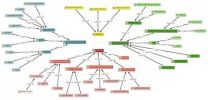(Press-News.org) Two new meta-analyses involving tree nuts (almonds, Brazil nuts, cashews, hazelnuts, macadamias, pecans, pine nuts, pistachios and walnuts) were recently published in the online publications, British Medical Journal Open (BMJ Open) (i) and PLOS ONE (ii). The BMJ Open article looked at the effects of tree nuts on metabolic syndrome (MetS) criteria and showed that tree nut consumption resulted in a significant decrease in triglycerides and fasting blood glucose. The PLOS ONE article focused on the effect of tree nuts on glycemic control in diabetes and showed significant decreases in HbA1c and fasting blood glucose levels.
Researchers from the University of Toronto conducted both meta-analyses. In the paper focusing on MetS, the analysis included 47 randomized control trials with 2,200 participants who were otherwise healthy or had MetS criteria, dyslipidemia (elevated levels of blood cholesterol and/or triglycerides), or type 2 diabetes. "We found that tree nut consumption of about two ounces per day was found to decrease triglycerides significantly by ~0.06 mmol/L and to decrease fasting blood glucose significantly by ~0.08 mmol/L over an average follow-up of eight weeks," stated Cyril Kendall, Ph.D., lead researcher of the study.
This is important since MetS is a cluster of risk factors shown to be associated with mortality, a twofold increased risk for cardiovascular disease, and a fivefold increased risk for type 2 diabetes. While the diagnostic criteria can vary, presence of any three of the five following conditions results in a diagnosis of MetS: abdominal obesity, elevated triglycerides, low HDL cholesterol (the good cholesterol), high blood pressure, and hyperglycemia (high blood sugar levels). Based on NHANES data from 2003-2006, an estimated 34.3% of the U.S. population has MetS.
In addition to the effect of nuts on MetS, the researchers also looked at the effect of nuts on glycemic control in those with diabetes. The PLOS ONE analysis included 12 randomized clinical trials with 450 participants and compared the effects of diets emphasizing tree nuts to isocaloric diets without tree nuts on HbA1c (a marker of longer term blood sugar control), fasting blood glucose, fasting insulin and insulin resistance (HOMA-1R). The results showed that diets emphasizing about two ounces of tree nuts per day significantly lowered HbA1c (P=0.0003) and fasting glucose (P=0.03) compared to the control diets. While neither diet showed significant effects on fasting insulin and insulin resistance, the direction of effect favored tree nuts.
According to Dr. Kendall, "Both of our analyses indicate that daily tree nut consumption has an overall metabolic benefit and can improve risk factors for metabolic syndrome, and glycemic control in individuals with type 2 diabetes."
"With MetS and diabetes on the rise worldwide, this is yet another reason to include tree nuts in your diet every day," states Maureen Ternus, M.S., R.D., Executive Director of the International Tree Nut Council Nutrition Research & Education Foundation (INC NREF). "In 2003, FDA (in its qualified health claim for nuts and heart disease) recommended that people eat 1.5 ounces of nuts per day—well above current consumption levels. We need to encourage people—especially those at risk for MetS and those with diabetes—to get their handful of nuts every day."
INFORMATION:
The International Tree Nut Council Nutrition Research & Education Foundation (INC NREF) represents the research and education arm of the International Tree Nut Council (INC). INC is an international, non-profit, non-governmental organization dedicated to supporting nutrition research and education for consumers and health professionals throughout the world and promoting new product development for tree nut products. Members include those associations and organizations that represent the nine tree nuts (almonds, Brazils, cashews, hazelnuts, macadamias, pecans, pine nuts, pistachios and walnuts) in more than 40 producing countries. For more information, please visit our website at http://www.nuthealth.org.
Editor's Note: To view the full studies please see here:
(i) http://bmjopen.bmj.com/content/4/7/e004660.full?keytype=ref%5B1%5D&ijkey=wszZ1mCN44mw0KO
(ii) http://www.plosone.org/article/info%3Adoi%2F10.1371%2Fjournal.pone.0103376
New international tree nut council study looks at nuts, diabetes and metabolic syndrome
Tree nuts have a positive impact on glycemic control in diabetes and on metabolic syndrome criteria
2014-07-31
ELSE PRESS RELEASES FROM THIS DATE:
Vets' alcohol problems linked to stress on the home front
2014-07-31
VIDEO:
Research findings show the important role civilian life and the accompanying stress plays in cases of alcohol use disorder among returning National Guardsmen.
Click here for more information.
Regardless of traumatic events experienced during deployment, returning National Guard soldiers were more likely to develop a drinking problem if faced with civilian life setbacks, including job loss, legal problems, divorce, and serious financial and legal problems—all commonplace ...
Veterans' alcohol problems linked to stress on the home front
2014-07-31
Ann Arbor, MI, July 31, 2014 — Regardless of traumatic events experienced during deployment, returning National Guard soldiers were more likely to develop a drinking problem if faced with civilian life setbacks, including job loss, legal problems, divorce, and serious financial and legal problems — all commonplace in military families. Results of the study by researchers at Columbia University's Mailman School of Public Health are published online in the American Journal of Preventive Medicine.
Alcohol abuse is a major concern for reservists returning home. Nearly 7% ...
Research proves there is power in numbers to reduce electricity bills
2014-07-31
Consumers can save money on their electricity bills and negotiate better deals by joining forces with similar groups of customers to switch energy suppliers according to new research.
Collective switching or group buying schemes, where thousands of consumers join forces to negotiate cheaper electricity tariffs, are becoming more popular in the UK as bills continue to rise putting increasing pressure on household budgets. Initiatives like Which?'s Big Switch, People Power or the Big Deal have helped thousands of consumers to save, on average, up to a third of their yearly ...
Engineering a protein to prevent brain damage from toxic agents
2014-07-31
Research at New York University is paving the way for a breakthrough that may prevent brain damage in civilians and military troops exposed to poisonous chemicals—particularly those in pesticides and chemical weapons.
An article in the current issue of the journal ChemBioChem outlines the advancement in detoxifying organophosphates, which are compounds commonly used in pesticides and warfare agents. The patent-pending process was developed by NYU School of Engineering Associate Professor of Chemical and Biological Engineering Jin Kim Montclare, along with Richard Bonneau, ...
Transplantation shown to be highly effective in treating immune deficiency in children
2014-07-31
Babies who are born with severe combined immunodeficiency (SCID) can be successfully treated with a transplant of blood-forming stem cells, according to experts led by Memorial Sloan Kettering's Richard J. O'Reilly, MD, a world-renowned pioneer in the development of transplant protocols. Their review will be published in the July 30 issue of the New England Journal of Medicine.
SCID is a group of inherited disorders that cause the immune system to severely malfunction. When this breakdown occurs, babies no longer have the ability to fight off routine infections because ...
Journal supplement details progress in African medical education
2014-07-31
Medical education in sub-Saharan Africa is being revitalized and expanded through a U.S.-funded effort that is dramatically increasing enrollment, broadening curricula, upgrading Internet access and providing cutting-edge skills labs and other technologies.
In the first substantial publication by participants of the $130 million Medical Education Partnership Initiative (MEPI), more than 225 authors detailed progress being made at the African institutions. Their reports are in a supplement being published today by the journal Academic Medicine. Begun in 2010, MEPI is ...
Resistance to key malaria drug spreading at alarming rate in Southeast Asia
2014-07-31
WHAT:
Resistance to artemisinin, the main drug to treat malaria, is now widespread throughout Southeast Asia, among the Plasmodium falciparum (P. falciparum) parasites that cause the disease and is likely caused by a genetic mutation in the parasites. However, a six-day course of artemisinin-based combination therapy—as opposed to a standard three-day course—has proved highly effective in treating drug-resistant malaria cases, according to findings published today in the New England Journal of Medicine. The research was conducted by an international team of scientists ...
Biologists describe mechanism promoting multiple DNA mutations
2014-07-30
DNA mutations—long known to fuel cancer as well as evolutionary changes in a living organism—had been thought to be rare events that occur randomly throughout the genome.
However, recent studies have shown that cancer development frequently involves the formation of multiple mutations that arise simultaneously and in close proximity to each other. These groups of clustered mutations are frequently found in regions where chromosomal rearrangements take place.
The discovery, published in the journal Cell Reports, may one day lead to new cancer therapies, according to ...
Classic Lewis Carroll character inspires new ecological model
2014-07-30
Inspired by the Red Queen in Lewis Carroll's Through the Looking Glass, collaborators from the University of Illinois and National University of Singapore improved a 35-year-old ecology model to better understand how species evolve over decades to millions of years.
The new model, called a mean field model for competition, incorporates the "Red Queen Effect," an evolutionary hypothesis introduced by Lee Van Valen in the 1970s, which suggests that organisms must constantly increase their fitness (or ability to survive and reproduce) in order to compete with other ever-evolving ...
Diverticulitis patients reveal psychological, physical symptoms long after acute attacks
2014-07-30
UCLA researchers interviewed people with diverticulitis and confirmed that many suffer psychological and physical symptoms long after their acute illness has passed.
For the study, published this week in the peer-reviewed journal Quality of Life Research, a UCLA team led by Dr. Brennan Spiegel interviewed patients in great detail about the symptoms they experience weeks, months or even years after an acute diverticulitis attack. Their striking findings add to growing evidence that, for some patients, diverticulitis goes beyond isolated attacks and can lead to a chronic ...
LAST 30 PRESS RELEASES:
Far-field superresolution imaging via k-space superoscillation
10 Years, 70% shift: Wastewater upgrades quietly transform river microbiomes
Why does chronic back pain make everyday sounds feel harsher? Brain imaging study points to a treatable cause
Video messaging effectiveness depends on quality of streaming experience, research shows
Introducing the “bloom” cycle, or why plants are not stupid
The Lancet Oncology: Breast cancer remains the most common cancer among women worldwide, with annual cases expected to reach over 3.5 million by 2050
Improve education and transitional support for autistic people to prevent death by suicide, say experts
GLP-1 drugs like Ozempic could cut risk of major heart complications after heart attack, study finds
Study finds Earth may have twice as many vertebrate species as previously thought
NYU Langone orthopedic surgeons present latest clinical findings and research at AAOS 2026
New journal highlights how artificial intelligence can help solve global environmental crises
Study identifies three diverging global AI pathways shaping the future of technology and governance
Machine learning advances non targeted detection of environmental pollutants
ACP advises all adults 75 or older get a protein subunit RSV vaccine
New study finds earliest evidence of big land predators hunting plant-eaters
Newer groundwater associated with higher risk of Parkinson’s disease
New study identifies growth hormone receptor as possible target to improve lung cancer treatment
Routine helps children adjust to school, but harsh parenting may undo benefits
IEEE honors Pitt’s Fang Peng with medal in power engineering
SwRI and the NPSS Consortium release new version of NPSS® software with improved functionality
Study identifies molecular cause of taste loss after COVID
Accounting for soil saturation enhances atmospheric river flood warnings
The research that got sick veterans treatment
Study finds that on-demand wage access boosts savings and financial engagement for low-wage workers
Antarctica has lost 10 times the size of Greater Los Angeles in ice over 30 years
Scared of spiders? The real horror story is a world without them
New study moves nanomedicine one step closer to better and safer drug delivery
Illinois team tests the costs, benefits of agrivoltaics across the Midwest
Highly stable self-rectifying memristor arrays: Enabling reliable neuromorphic computing via multi-state regulation
Composite superionic electrolytes for pressure-less solid-state batteries achieved by continuously perpendicularly aligned 2D pathways
[Press-News.org] New international tree nut council study looks at nuts, diabetes and metabolic syndromeTree nuts have a positive impact on glycemic control in diabetes and on metabolic syndrome criteria



